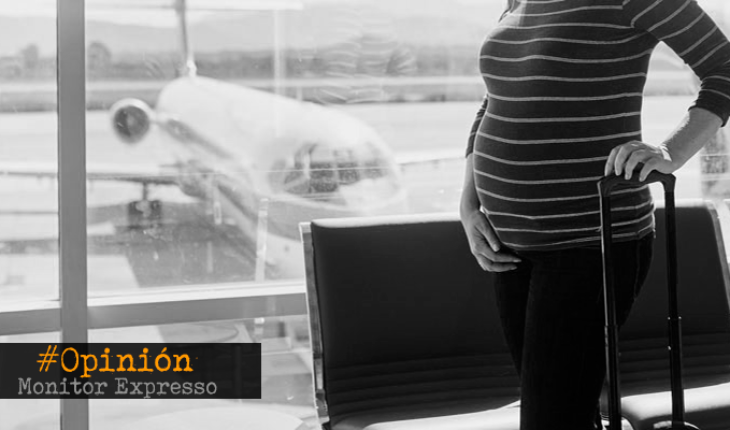From: Pedro Rubio Sotelo
Consular officers can now deny visas to pregnant women, which could prevent them from accessing medical care.
The new policy to prevent pregnant women from traveling to the United States for “birth tourism.” Consular officers can now deny visitor visas to women who have “reasons to believe” who will give birth in the United States to obtain U.S. citizenship for their children.
The policy is already controversial because it gives officers, who are not medical experts, broad discretion in determining whether someone is pregnant or not. If an officer believes that a woman is likely to have a baby in the United States, she can automatically conclude that a person’s “primary purpose” in traveling is birth tourism and prevent her from entering the country.
Women’s health advocates and experts said the rule is a brazen attempt to control women and could prevent mothers from waiting for life-saves medical care.
“It’s very discriminatory and it’s also putting women’s lives at risk,” said Nora Ellmann, an associate researcher for women’s health and rights at the Center for American Progress. “The rule is to position pregnant women as a threat to national security.”
The Trump administration has a history of trampling on reproductive rights, especially with regard to women of color. While immigration and customs enforcement (ICE) stopped women pregnant under a directive from President Barack Obama, Trump reversed that order and the number of pregnant women in detention has increased by 52% since taking office. Scott Lloyd, the former director of the Office of Refugee Resettlement (ORR), blocked pregnant immigrant teenage girls in ORR custody from aborting, and allegedly traced their menstrual cycles. And Trump has talked about using an executive order to end birthright citizenship, to prevent immigrants from having what he calls “anchor babies.”
The rule is to position pregnant women as a threat to national security.
Nora Ellmann, Associate Researcher for Women’s Health and Rights at the Center for American Progress
The theme of “birth tourism” recently made headlines after a woman travelling from Hong Kong to Saipan, a U.S. territory in the Pacific, was forced into a pregnancy test before boarding the flight. He had to sign a medical clearance form that said he had “a body shape/size similar to a [sic] pregnant woman,” according to a blog post the woman wrote. While there are no credible statistics on how widespread childbirth tourism is, media coverage is generally focused on women in China and Russia.
The new policy does not apply to the 39 countries whose citizens can travel to the United States without a visa, such as France, Ireland and New Zealand, and it is unclear how it will work for foreign travellers from other countries.
The State Department said officers would only address the issue of pregnancy if they “had a specific and articulable reason to believe that a visa applicant may be pregnant and plan to give birth in the United States.”
Women’s health advocates fear that the dystopian process will involve an officer behind a glass window that evaluates a woman’s body, which could result in discrimination based on gender, age and size.
“It’s clearly a great violation of a woman’s privacy and dignity,” said Sung Yeon Choimorrow, executive director of the National Women’s Forum in Asia, Pacific and North America. “There’s plenty of room for subjectivity in this. What kind of questions are you going to ask? This is all so absurd.”
The rule also assumes that pregnant women only travel to give birth in another country, when they could go abroad for business or vacation, Choimorrow added.
Even more worrying is that an officer with no medical history now has the power to decide if someone is pregnant and whether he deserves medical treatment in the United States, said Dr. Carolyn Sufrin, obstetrician-gynecologist who teaches at Johns Hopkins University. “It’s completely out of the realm of what they can and should be doing.”
Although the rule specifies that pregnant women seeking medical treatment in the U.S. can receive visas if they have the means to pay their medical bills, the policy also states that pregnant women have to demonstrate “to the satisfaction of a consular official.” who have a “legitimate reason” to see an American doctor. According to Ellmann, this wording leaves serious decisions that can save lives for people without a medical history.
“They can say, ‘Well, we don’t think it’s a sufficient basis, because it can get the treatment, which may or may not be so good, right outside the United States,'” said Jeffrey Gorsky, a lawyer who worked at the State Department’s visa office for 36 years.
Dr. Sufrin said that even if the State Department plans to involve medical professionals, it would be unethical for any physician to participate in a process that denies medical care to someone based on factors such as nationality, citizenship status, or any other reason.
Gorsky said the rule seems extremely difficult to implement, especially given the fact that women interested in “birth tourism” can apply for long-term travel visas years before becoming pregnant. He thinks the new policy is more symbolic than practical: a muscle flexion for Trump’s anti-immigrant base.
The opinions expressed in the columns are the sole responsibility of those who subscribe to them and do not necessarily represent the thought or editorial line of Monitor Expresso
translated from Spanish: Denying Visas to Pregnant Women “Birth Tourism”
February 26, 2020 |





